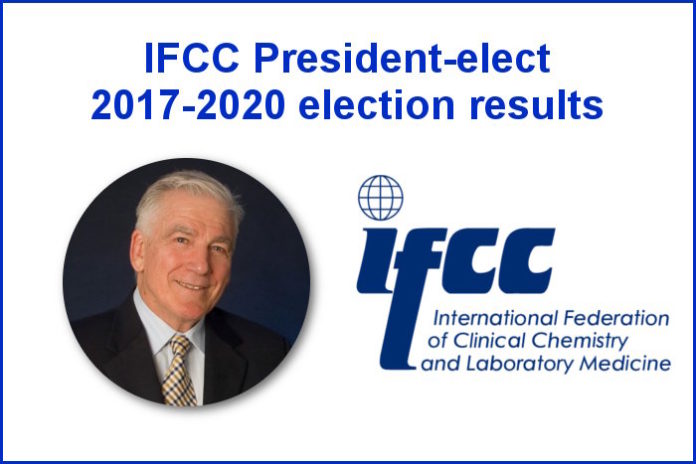The result of the ballot for the election of the President elect, to commence the term of office on January 1st 2017, to be confirmed as President for the term 2018-2020, was concluded on September 30th 2016. In summary 73 societies voted (out of 86 having the right to vote), giving preferences as follows:
Prof. Howard Morris (Australasian Association of Clinical Biochemists-AACB) received votes: 41 (56%)
Prof. Tomris Ozben (Turkish Biochemical Society-TBS) received votes: 23 (32%)
Prof. Tomáš Zima (Czech Society of Clinical Biochemistry – CSKB) received votes: 9 (12%)
Full details of the ballot may be found from the independent company that conducted the ballot: https://electionbuddy.com/
Accordingly to the results, the President elect is Prof. Howard Morris.
About Dr. Howard Morris
Howard Morris (PhD, FAACB, FFSc(RCPA)) holds a joint appointment as Professor of Medical Science in the School of Pharmacy and Medical Sciences, University of South Australia and a Chief Medical Scientist in Chemical Pathology at SA Pathology, Adelaide Australia. Between 2003 and 2008 he was the Secretary of the Scientific Division of the IFCC and has served as a member of the IFCC Task Force on the Global Campaign on Diabetes Mellitus (2003-2008), Task Force on International Clinical Liaison (2009-2011) and International Scientific Committee XXIst International Congress of Clinical Chemistry and Laboratory Medicine, Berlin Germany, 2011 (2007-2011). Within the Asia PacificFederation of Clinical Biochemistry (APFCB) he served as Chair, Scientific Committee (2002-2004) and Chair, Scientific Organising Committee, Member Organising Committee for 10th Asian Pacific Congress of Clinical Biochemistry (2002-2005). He was the Australasian Association of Clinical Biochemists (AACB) representative to the Councils of the IFCC and APFCB (1998-2004), served on AACB Council (1998-2002) and Editor of the ClinicalBiochemist Reviews (1994-2002). He was awarded an AACB Outstanding Service Medallion (2003) and the W. Roman Travelling Lectureship (2004).
Dr Morris currently services as a Clinical Scientist for the Chemical Pathology Directorate, SA Pathology providing clinical advice and comments in the discipline. He had 24 years experience working in diagnostic clinical biochemistry in the field of immunoassay and endocrinology between 1976 and 2000 during which he managed a major clinical endocrinology laboratory for the Institute of Medical and Veterinary Science (IMVS, Adelaide) providing services for the Royal Adelaide Hospital (RAH) and the state of South Australia. In 1997/98, the laboratory reported some 245,000patient results. Between 2003 and 2009 he was the Director of the Hanson Institute, the research arm of the IMVS and RAH. In 2009 the Hanson Institute administered infrastructure to support the research of some 300 staff and 100 postgraduate students who generated external grants amounting to approximately $AUD 30 million annually.
Dr Morris leads an active research team publishing 242 refereed publications, reviews and book chapters and being awarded over $7 million in competitive research grants. His research investigates the pathophysiology of metabolic bone disease and the effects of hormones including vitamin D funded by the National Health and Medical Research Council and Australian Research Council, the major competitive funding bodies in Australia. His latest work hasidentified the basis for vitamin D requirement to reduce the risk of fractures amongst the elderly. He was invited to present the Louis Avioli Memorial Lecture at the 2009 Annual Scientific Meeting of the American Society for Bone and Mineral Research on this topic. He is also Deputy Chair of a South Australian Department of Health Working Party on Osteoporosis and Fracture Prevention.


































